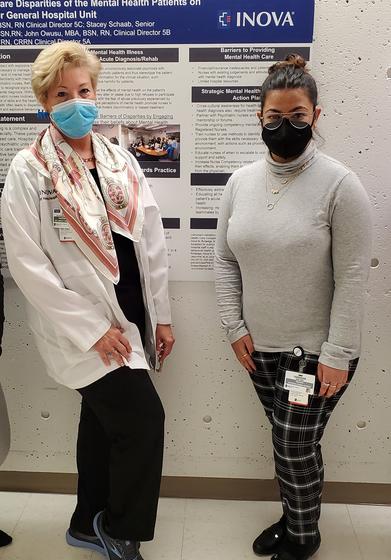Interested in a degree and career in health administration? Get the inside scoop from recent graduates and faculty in Mason's Health Administration program.
Teaching students to ‘move fast and wear comfortable shoes’
In a field like health care, thousands of both minute and momentous details shape a patient’s experience and can sometimes mean the difference between life and death. From managing the process for sterilizing surgical equipment to successfully discharging a patient, care providers and health administrators must have the knowledge, skills, and experience to execute all those minute and momentous details.

Preparing aspiring health care providers is no small task and requires a true partnership between academic instructors and internship preceptors. The value of partnership to successfully prepare students for a career in health administration is exemplified by the relationship between Anastasia (Stacey) Schaab, senior director of nursing rehabilitation at Inova Mount Vernon Hospital, and John (Jay) Shiver and Virginia (Ginny) Blair, associate professors in the Health Administration program in Mason’s Department of Health Administration and Policy.
“Healthcare is exceptionally complex. It is one of the largest components of every community and essential for everyone,” says Shiver. “The health administration internship introduces students to important organizations but, more importantly, it allows the student to work with respected leaders who provide personal mentorship and guidance that will carry forward into their professional careers.”
Schaab has been a preceptor for Mason students for more than six years and provides students with once-in-a-lifetime, hands-on experience. “We know that the students who come from Mason are hand-picked by Jay and Ginny. They tell their students to ‘move fast and wear comfortable shoes,’” says Schaab. “Based on the caliber of students [Mason sends], I know they will be prepared, polite, and ready to synthesize all they are experiencing. They have learned during class time, and now it’s time to apply what they’ve learned here.”
“Health administration is an applied degree,” says Blair. “Students need the practical experience of being part of an organization. During the course of their studies, students are exposed to the fundamental principles of health care management, and the internship affords students an opportunity for exposure to ‘real life’ experience under the tutelage of a well-respected health care professional as a preceptor.”
Harsha Nayyar, BS Health Administration ’21, says that her internship at Inova Mount Vernon Hospital was valuable. “Interns move around the hospital and get exposure to so many different departments and people. The kind of projects that Stacey assigned to me when I was an intern, and [later] leading the group of interns, gave me a magnificent experience and prepared me well for my current job.”
Kelly Simons, BS Health Administration ’20, encourages interns to “concentrate on the soft skills that are most in-demand in the workplace. Soft skills include being passionate, having a strong work ethic, being self-disciplined, and being capable of handling challenges.” She emphasizes that the internship provides unique opportunities to build these skills.
Internship experiences are customized to meet the student’s unique interests. For example, under Schaab’s guidance, students at Inova Mount Vernon Hospital have the opportunity to spend a day in the sterile processing department learning the many steps and nuances in ensuring that thousands of tools are properly sterilized and stored for future use. Other students gain experience by participating in complex case reviews for acute inpatient rehabilitation admission, such as heart or lung transplants, where they observe discussions about how to improve hand-offs between care providers, prevent readmission after discharge, and reduce the patient’s length of stay. As part of their experience, students are encouraged to participate in failure modes and effectiveness training in which they learn to evaluate processes for possible failures and to prevent them proactively to reduce the risk of harm to both patients and staff.
As future leaders, the students must also be prepared to direct a hospital in the event of a disaster, and Federal Emergency Management Agency (FEMA) certifications 100, 200, 700, and 800 are required to fulfill the internship. As part of the certification, students receive "basic training" on incident command and the National Incident Management System (NIMS).
Schaab helps students understand the importance of leadership—and gives them the opportunity to observe both “the good and the bad.” The internship experience is so positive that it’s not unusual for students to complete multiple internships with Schaab and to assist in training subsequent intern cohorts. Several students have become full-time employees after graduation. “The entire hospital truly engages and educates our interns,” says Schaab.
Schaab advises students seeking an internship in health administration to “be flexible, work as many hours as you can, and ask a lot of questions. This is your experience, and you’ll get out of it what you put in.” And remember to wear comfortable shoes.
